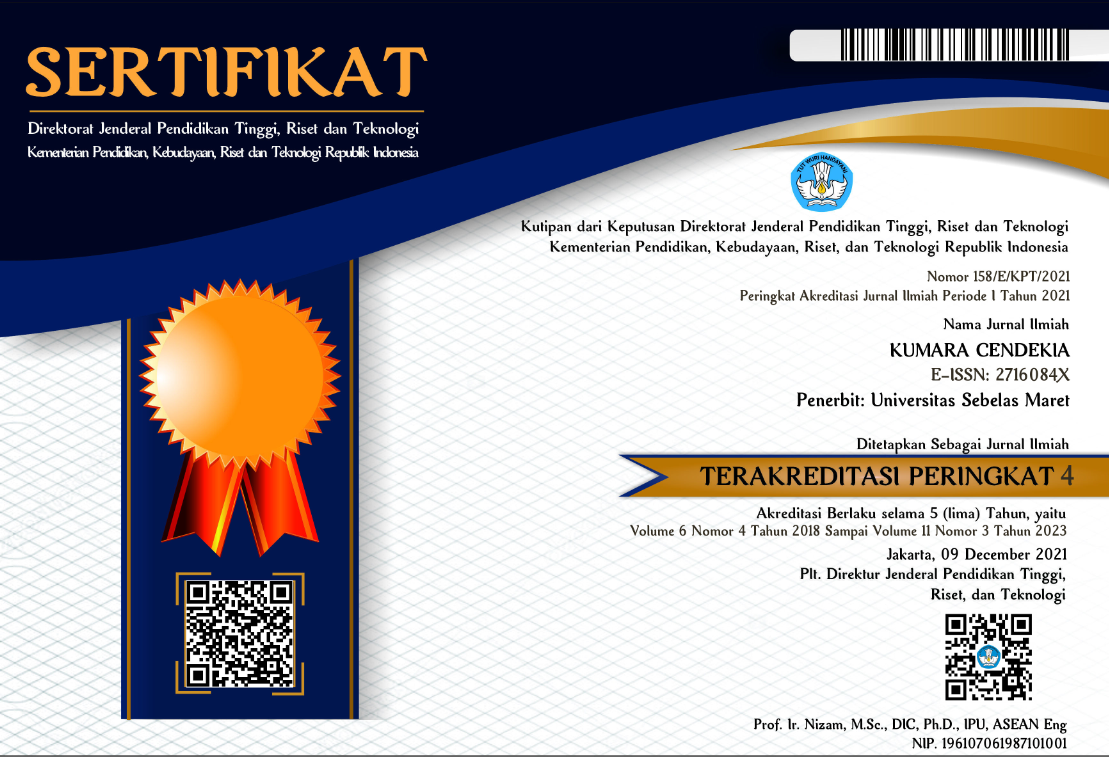EFEKTIVITAS MATH GAMES TERHADAP KEPERCAYAAN DIRI ANAK USIA 5-6 TAHUN
Abstract
Penelitian ini tergolong penelitian quasi experiment yang bertujuan untuk menguji efektivitas math games terhadap kepercayaan diri anak usia 5-6 tahun. Penelitian ini menggunakan desain between subject design dengan menggunakan sampel sebanyak 45 anak, 22 anak sebagai kelompok eksperimen dan 23 anak sebagai kelompok kontrol. Data dikumpulkan dengan menggunakan skala untuk mengukur kepercayaan diri anak. Analisa data menggunakan paired sample t-test dan independent sample t-test dengan SPSS 15 for windows. Hasil penelitian menunjukkan bahwa math games memiliki efek positif terhadap kepercayaan diri anak usia 5-6 tahun.
Kata Kunci: math games, kepercayaan diri ,pendidikan anak usia dini.
Full Text:
PDF (Bahasa Indonesia)References
Bandura, A. (1994). Self-efficacy. In V. S. Ramachaudra (Ed.), Encyclopedia of human behavior (Vol. 4, pp. 71-81). New York, NY: Acedemic Press. Diperoleh tanggal 28 Januari 2016, dari https://schoolar.google.com.
Bragg, L. (2003). Children’s Perspectives on Mathematics and Game Playing. Diperoleh tanggal 28 Januari 2016, dari https://schoolar.google.com.
Brewer, A.J. (2007). Introduction to Early Children Education trough Prymary Grades. Pearson : Allin and Bacon.
Department of Public Instruction. (2015). Building Conceptual Understanding and Fluency Through Games for the Common Core Standards in Mathematics. Public School of North Carolina : Amerika.
Doucet, F. & Tudge, J.R.H. (2004) . Early mathematical experiences: observinng young Blac and White children’s everyday activities, Early Childhood Research Quarterly, 19 (2004) ,21–39. Diakses pada 05 Februari diperoleh dari www.sciencedirect.com.
Ernest, P. (1986). Games. A Rationale for Their Use in the Teaching of Mathematics in School. Mathematics in School, Vol. 15, No. 1 pp 1-5. Diperoleh 28 Januari 2016,dari https://schoolar.google.com.
Ku, O., Chen,S,Y, Wu, D.H, Lao, A.C.C, & Chan , T.W. (2014). The Effects of Game-Based Learning on Mathematical Confidence and Performance: High Ability vs. Low Ability. Educational Technology & Society, 17 (3), 65–78. Diakses pada tanggal 05 Januari 2015, diperoleh dari https://schoolar.google.com.
Lautser, P . (2002). Tes Kepribadian. Terj. D.H Gulo. Jakarta : Gaya Media Pratama.
Muniarti, E. (2012). Mengajarkan Matematika dengan Fun. Yogyakarta : Mentari Pustaka.
Rich and Mattox. (2010). Metode Megaskill untuk Usia 1-6 Tahun. Mizan Publika : Bandung .
Schrio , S.M . (2009). Mega-Fun Math Games and Puzzles for the Elementary Grades. Published by Josey-Bass. Diperoleh dari https://googlebook.com diakses pada 05 Februari 2016.
Refbacks
- There are currently no refbacks.












